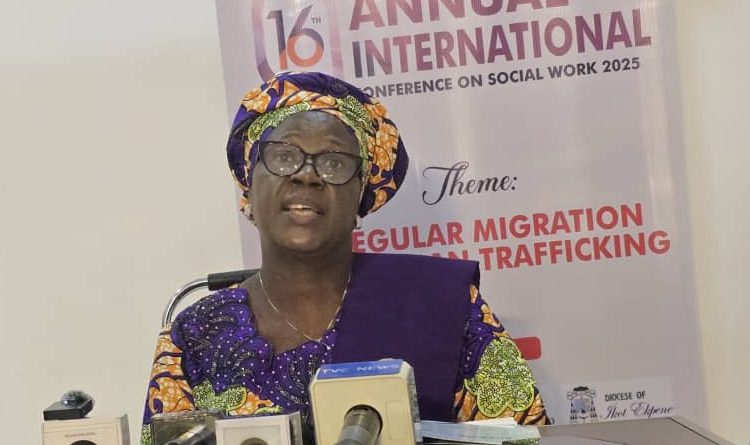Institute condemns irregular migration, human trafficking, seeks stronger action
The Chartered Institute of Social Work Practitioners of Nigeria, CISWPN, on Thursday, expressed strong concern over rising challenges of irregular migration and human trafficking.
It described them as pressing social problems with far-reaching national implications, and expressed commitment towards tackling them.
Speaking to journalists at the ongoing 16th International Conference on Social Work, held in Enugu, the National President and Chairman of Council, Prof. Oluwayemisi Obashoro-John, said the conference provides a platform for professionals and stakeholders to discuss practical solutions to issues relating to migration, trafficking, and youth vulnerability.
She explained that the Institute, which came into existence in 2009 and became chartered in 2022, has grown from an initial 200 members to more than 15,000 members across the world.
The CISWPN president also noted that the body maintains active collaborations with international partners, including USAID, UKAID, and several Italian organisations, to support projects focused on women’s rights, child welfare, and vulnerable groups.
“We have been very active in programmes such as fistula repair and rehabilitation, campaigns against female genital mutilation, and interventions aimed at protecting vulnerable women and children.
“This year’s conference focuses strongly on the issues of irregular migration and human trafficking, which have become critical social concerns in Nigeria,” John said.
Responding to questions on the causes of irregular migration, the CISWPN president stressed that the issue goes far beyond economics.
“Irregular migration is not just an economic problem; it is a social issue rooted in questions of dignity, justice, and human rights.
“People migrate irregularly because they feel alienated, hopeless, or deprived of opportunities at home. When youths finish school without jobs or are limited by age restrictions, they begin to believe their future lies elsewhere,” she said.
Prof. John also emphasised the need for stronger collaboration among local and international partners.
She noted that agencies such as NAPTIP and several NGOs are making efforts, but urged the government to create more sustainable opportunities for young Nigerians.
“The truth is that our people’s eyes are still outside because they feel there is no future here.
“But the grass is not greener on the other side — it only appears so. What we need is to make things work here, at home,” she added.
Delegates from across Nigeria are attending the conference.
